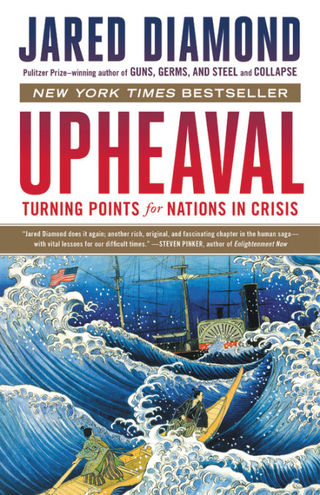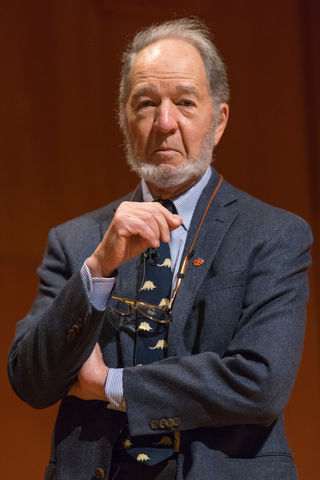
Trauma
A Review of Jared Diamond's Upheaval
Can psychological ideas help explain geopolitical crises?
Posted June 11, 2019

In his latest book Upheaval, Jared Diamond, author of Guns, Germs, and Steel and professor of geography at UCLA, begins with a story of a personal crisis.
After completing his undergraduate degree he moved to the University of Cambridge to pursue a Ph.D. in physiology. There he encountered a problem: His mentor expected him to design equipment to research eels, but Diamond had no facility with constructing such materials and quickly grew frustrated (as did his mentor).
Soon he became disillusioned with his career path and contemplated leaving his program altogether. After a conversation with his father, who encouraged him to give it another half-year, he felt his anxieties lift and would eventually complete his degree.
In hindsight, Diamond views this time in his life as a turning point, a crisis defined by "the sense that something important about one's current approach to life isn't working, and that one has to find a new approach." After sharing his own story, he devotes the rest of his recent book Upheaval to examining the same sort of crisis moments in the history of six different nations.
Diamond happens to be married to a therapist, and this caused him to wonder if therapeutic techniques designed to treat people in crisis could also be used to "diagnose" countries. He has a very particular sort of therapy in mind, short-term crisis therapy. He shares 12 factors helping individuals navigate crises, which he has distilled from the literature and translates each of them to geopolitical matters. The rest of the book consists of case studies applying these principles to nations in crisis.
Diamond's choice of countries is not random but rather selected based upon his familiarity with the history and the people. One of the examples which he investigates is Chile. He begins, "In 1967 I spent a sabbatical in Chile, at a time when everything there seemed peaceful." He quickly follows that anecdote with the assertion that, "Chileans identify with Europe and with the U.S., rather than with Latin America." No data is given to back this up, and as someone who has family in South America, I can confirm that this viewpoint is not as unique to Chileans as Diamond seems to think.
The statement, although minor, illustrates a major flaw that runs throughout the book: Upheaval is short on hard data and largely based upon observations and opinions offered by Diamond's upper class, educated friends, which he treats as fact.

The central crisis of Chile with which Diamond is concerned is the election of Salvador Allende and the overthrow of his government in a military coup that ended with Augusto Pinochet assuming his dictatorial reign. Diamond bases his account of Allende's tenure on "public information about him, and on the recollections of a Chilean friend of mine who knew him and his family well." To hear Diamond (or, perhaps more accurately, his Chilean friend) tell the story, Allende was an avowed Marxist who terrified the right-wing and centrists by his election and fatally miscalculated the wishes of the country by seeking to move them to the radical left to align with Castro and the Soviet Union. Incredibly, Diamond almost entirely absolves the United States, particularly the CIA, of any role in the coup: "Although the CIA had been constantly supporting opposition to Allende and seeking to undermine him, even Americans who exposed CIA meddling in Chilean affairs agree that the coup was executed by Chileans themselves, not by the CIA." Documents which are easily available online show that the CIA had been trying to prevent Allende from taking power since 1964, nine years before the coup. An internal 1970 memo stated that it was the United States' "firm and continuing policy that Allende be overthrown by a coup." The 1975 Church Report found that, "The CIA attempted, directly, to foment a military coup in Chile."
None of these documents are hard to find; it only took a basic idea of where to look and a half hour of Google to find the three I linked above. And these aren't the only basic errors that plague Diamond's book. Anand Giridharadas' New York Times review lays out several more. The book is sloppy and thinly-sourced, on the rare occasion that sources are actually cited. These errors are enough to render Diamond's conclusions deeply questionable, yet I want to take a closer look at his application of short-term crisis therapy techniques to nations.
I will admit that I bring my own biases to the table. While I fully believe that short-term interventions can work for a segment of the population, I mostly practice long-term psychodynamic therapy, and my sympathies lie in that direction. Diamond disagrees that such an approach is appropriate to his subject matter: "Obviously, the traditional methods of long-term psychotherapy, which often focus on childhood experiences in order to understand root causes of current problems, are inappropriate in a crisis because they are much too slow." While I don't think Diamond's slapdash approach is of benefit to anyone, it is worth considering his point that depth psychology is an inappropriate match for political considerations.
Short-term therapy came about to help people who already had relatively strong and healthy senses of self navigate a sudden transition; Diamond's own experience is prototypical. Is that the best analogy for what nations in crisis experience, though? It's hard to see the CIA-sponsored overthrow of Chile's democratically-elected government and the brutal reign of the murderous Pinochet as a temporary aberration that could be cured by the geopolitical equivalent of six hours in the therapist's office.
Rather, the Chilean coup represented the intersection of the United States' and the Soviet Union's expansionist tendencies, the attempt to dismantle foreign control of Chile's economy which was the lingering result of the colonial system, and the preceding decades of bitter conflict between the left-wing and right-wing factions, just to name a few prominent factors. Chile-as-a-patient would not be the patient trying to figure out whether or not her job was a good fit for her but the patient who has endured decades of trauma, feels conflicted about which direction she should pursue, and has multiple people competing for her attention. The sort of patient that would benefit more from long-term psychodynamic treatment.
A book that took a psychoanalytic approach to nations in conflict would certainly be more interesting than Upheaval, but the issues with Diamond's book far exceed his choice of therapeutic modality. To be completely frank, I doubt that anyone other than a cisgender white male would feel comfortable putting his name to this collection of half-baked opinions, nor be able to find a publisher to print them. There is already a long tradition of applying psychological principles to political concerns, and I would recommend that anyone interested in that work look elsewhere for ideas on how to connect the two.



